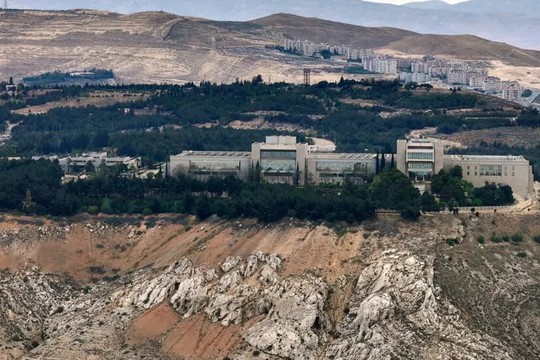An aerial photo shows the Syrian presidential palace in Damascus' Mount Qasyoun.
Photo: AFP
An Israeli airstrike near Damascus struck close to Syrian leader Ahmad al-Sharaa’s residence, as armed clashes intensify across southern Syria and tensions rise over Druze community security, Al Mayadeen informs.
Israel launched airstrikes early Friday targeting a location just 400 meters from the Syrian Presidential Palace in Damascus, where President Ahmad al-Sharaa resides, according to Al Mayadeen’s correspondent. The Israeli military later confirmed the attack, stating that its aircraft had struck the area in what it described as a warning to the Syrian government.
In a joint statement, Israeli Prime Minister Benjamin Netanyahu and Security Minister Israel Katz said, “This is a clear message to the Syrian regime. We will not allow forces to be sent south of Damascus or any threat to the Druze community.”
The latest confrontation follows several days of deadly unrest in southern Damascus. On Tuesday, violence broke out between government-backed armed groups and local residents in Jaramana and Ashrafiyet Sahnaya, resulting in approximately 70 fatalities. The dead included civilians, armed factions, and members of Syria’s General Security Force.
Syrian Information Minister Hamza Mustafa accused Israel at the time of taking advantage of the internal instability. “Israel is trying to play the sectarian card to gain a foothold in Syria as part of its ongoing plans,” he warned.
Reports have emerged of a tense close encounter between Turkish and Israeli fighter jets following a series of Israeli airstrikes targeting multiple sites in Syria on the evening of May 2, 2025. The incident underscores escalating regional tensions as both nations vie for influence in the volatile post-Assad Syrian landscape.
According to sources, the Israeli Air Force conducted bombing raids on several military targets in Syria, including sites near Damascus and in the Hama region, aimed at curbing the influence of extremist groups and preventing the use of former Assad regime assets. The strikes, part of a broader Israeli campaign in Syria since the fall of Bashar al-Assad, have drawn sharp criticism from Turkey, a key backer of Syria’s new interim government.
During these operations, Turkish fighter jets, reportedly operating in or near Syrian airspace as part of Ankara’s efforts to secure influence and establish a defense pact with Damascus, came into close proximity with Israeli aircraft. While no direct confrontation was reported, the incident highlights the growing risk of miscalculation between the two regional powers.
Turkey’s President Recep Tayyip Erdoğan condemned Israel’s actions, calling them a “dangerous and unacceptable provocation” aimed at destabilizing Syria. Turkish officials have been negotiating a defense agreement with Syria’s interim government, which could involve deploying Turkish forces and air defenses to Syrian airbases like T4 and Hama — sites previously targeted by Israeli strikes. Israel, wary of Turkey’s expanding presence near its border, has accused Ankara of seeking to establish a “Turkish protectorate” in Syria.
The close encounter follows weeks of heightened friction. On April 2, Israeli jets bombed Syrian airbases, including T4, shortly after Turkish military teams inspected them for potential deployment. Analysts suggest Israel’s strikes are a deliberate message to Turkey to limit its military ambitions in Syria. “If Turkey introduces jets or air defenses into Syrian airspace, it significantly restricts Israel’s operational freedom,” said Aron Lund, an analyst with Century International.
read more in our Telegram-channel https://t.me/The_International_Affairs

 10:49 04.05.2025 •
10:49 04.05.2025 •























